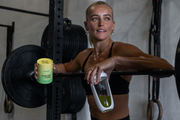
Let’s Talk Muscle (And How to Actually Build It) - Nutrition, Supplement & Workout Strategies
Building muscle isn’t just about lifting heavy weights - it's a strategic combination of smart training, proper nutrition, the right supplements and adequate recovery. Whether you're a total beginner or someone looking to break through a plateau, understanding the fundamentals is key to maximising muscle building!
In this post, we'll break down the essential components of muscle growth: from how much protein you really need, to the role of supplements like creatine, to structuring effective workouts and prioritising rest. These foundational tips will help you train smarter, recover better and grow stronger - step by step.
Training
You can’t build muscle without actually using it, right? The most effective way to stimulate muscle growth is through resistance training. This involves challenging your muscles using weights, resistance bands or even your own body weight. When we train, the stress placed on our muscles causes tiny tears in the muscle fibres. As these fibres repair, they grow back stronger and larger - a process known as muscle protein synthesis.
A well-rounded resistance training program should include a solid foundation of compound exercises - movements that target multiple muscle groups at once, such as squats, deadlifts, lunges, rows and overhead presses. These are highly efficient for building overall strength and size. Alongside them, isolation exercises like bicep curls, lateral raises, and calf raises are valuable for targeting specific muscles and improving muscular balance. While both are important, compound movements offer the biggest return on investment when it comes to building muscle!
As your body adapts to training, it’s essential to continue challenging your muscles - this is where progressive overload comes in. Progressive overload is the principle of gradually increasing the demands placed on your muscles to stimulate ongoing growth and strength development. You can apply this by adjusting:
- The exercises you perform
- The number of sets and reps
- The weight or resistance used
- The rest time between sets
- The range of motion in each movement
To keep progressing, aim to implement changes every 6 to 8 weeks, ensuring your muscles are constantly being pushed to adapt and grow. Mastering this principle is key to unlocking long term results in your muscle building journey.

Nutrition
When it comes to building muscle, protein is absolutely essential. During resistance training, muscle fibres experience tiny tears. Protein, once consumed, is broken down into amino acids, which are the building blocks your body uses to repair and rebuild those damaged fibres. Without sufficient protein, your body lacks the essential building blocks needed for muscle growth.
So, how much protein do you actually need? Protein requirements depend on your body weight and training goals. For general muscle building, it's recommended to consume 1.2-1.6 grams of protein per kilogram of body weight. For example, someone weighing 60kg should aim for roughly 72-96 grams of protein per day. However, research suggests that women looking to optimise muscle growth may benefit from slightly higher intakes - around 1.6-2.2g per kilogram.
To get the most out of your protein intake, it's important to spread it evenly throughout the day, aiming for 20-40 grams per meal. Including a post workout protein source, such as a protein smoothie or shake (THRIVE Plant Protein is delicious for this!) can also support faster recovery and improved muscle gains.
Creatine
Creatine is a naturally occurring compound that plays a vital role in helping muscles produce energy during high intensity exercise. By boosting the availability of quick energy in your muscles, creatine allows you to lift heavier, train harder, and ultimately promote greater gains in muscle strength and size. When used alongside consistent resistance training and proper nutrition, creatine has been shown to increase muscle mass, enhance performance, and support faster recovery.
So, how much do you need? While we do get small amounts of creatine from foods like red meat, fish and poultry, supplementation is recommended for those looking to optimise performance and results. Although a “loading phase” (typically 20g per day for 5-7 days) can help saturate muscles faster, it’s not essential. For most people, a daily dose of 3-5 grams of creatine monohydrate is both effective and sufficient to see the benefits over time.
Rest
While training breaks your muscles down, it's during rest (especially sleep) that they’re repaired, rebuilt and ultimately grow stronger.
During deep sleep, your body releases growth hormone, which plays a key role in muscle repair and regeneration. Sleep also helps regulate testosterone production, another essential hormone for muscle development. Without enough quality sleep, the process of muscle protein synthesis is disrupted, making it harder to recover and see progress. Aim for 7-9 hours of uninterrupted, restful sleep each night, ideally in a cool, dark environment. Struggling to wind down? Try a soothing mug of Moon Mylk before bed to ease into relaxation.
Rest days are just as important as your workout days. They give your muscles time to recover from training stress and rebuild stronger. To promote proper recovery, it’s best to allow 24-48 hours between training the same muscle group. This doesn’t mean you have to be completely inactive - unless your body is telling you to take it easy. Active recovery, like walking, stretching or gentle yoga can be a great way to support circulation and ease soreness while still giving your muscles the downtime they need.
Building muscle isn’t just about what you do in the gym - it’s a holistic process that involves smart training, proper nutrition, strategic supplementation, and intentional recovery. By consistently focusing on resistance training, prioritising your protein intake, supplementing with creatine and giving your body the rest it needs, you’ll be building not just muscle, but a stronger & more powerful version of yourself!
Ready to support your training with the right nutrition and supplements? Use my code GEORGIEG for 15% off everything mentioned in this blog - plus anything else on the Nu Harvest website. Enjoy!

By Georgie Grigg
Georgie Grigg is an Accredited Exercise Physiologist with a special interest in holistic health. She works primarily in occupational health and with private clients to help them achieve their health and wellness goals.
![[Nav_Category_shop-all.jpg] SHOP ALL](http://www.nakedharvestsupplements.com/cdn/shop/files/Nav_Category_shop-all_medium.jpg?v=229551162107522660)
![[Nav_Category_protein.jpg] PLANT PROTEIN](http://www.nakedharvestsupplements.com/cdn/shop/files/Nav_Category_protein_medium.jpg?v=3001415470058422894)
![[Nav_Category_pre.jpg] NATURAL PRE-WORKOUT](http://www.nakedharvestsupplements.com/cdn/shop/files/Nav_Category_pre_medium.jpg?v=6814586239177681891)
![[Nav_Category_electrolytes_v2.jpg] ELECTROLYTES](http://www.nakedharvestsupplements.com/cdn/shop/files/Nav_Category_electrolytes_v2_medium.jpg?v=8085001776675848411)
![[Nav_Category_moonmylk.jpg] BEDTIME HOT CHOCOLATE](http://www.nakedharvestsupplements.com/cdn/shop/files/Nav_Category_moonmylk_medium.jpg?v=12631405938823957710)
![[Nav_Category_Creatine.jpg] CREATINE](http://www.nakedharvestsupplements.com/cdn/shop/files/Nav_Category_Creatine_medium.jpg?v=5379326253006347654)
![[Nav_Category_Matcha.jpg] MATCHA & CHAI](http://www.nakedharvestsupplements.com/cdn/shop/files/Nav_Category_Matcha_medium.jpg?v=12528052245834137118)
![[Nav_Category_wellness.jpg] GORGEOUS GREENS](http://www.nakedharvestsupplements.com/cdn/shop/files/Nav_Category_wellness_medium.jpg?v=12528176088121862281)
![[Collagen_category.jpg] COLLAGEN](http://www.nakedharvestsupplements.com/cdn/shop/files/Collagen_category_medium.jpg?v=7874986955741861029)
![[Nav_Category_onthego.jpg] ON-THE-GO](http://www.nakedharvestsupplements.com/cdn/shop/files/Nav_Category_onthego_medium.jpg?v=9258968730903582129)
![[Nav_Category_accessories.jpg] ACCESSORIES](http://www.nakedharvestsupplements.com/cdn/shop/files/Nav_Category_accessories_medium.jpg?v=8748347510610747858)
![[Nav_Category_samples.jpg] SAMPLES](http://www.nakedharvestsupplements.com/cdn/shop/files/Nav_Category_samples_medium.jpg?v=12269696752583776743)
![[Nav_Category_giftcard.jpg] GIFT CARDS](http://www.nakedharvestsupplements.com/cdn/shop/files/Nav_Category_giftcard_medium.jpg?v=1625935370118938582)
![[Nav_Category_pilates.jpg] Yoga/Pilates](http://www.nakedharvestsupplements.com/cdn/shop/files/Nav_Category_pilates_medium.jpg?v=13143021470193189408)
![[Nav_Category_high-intensity.jpg] High Intensity](http://www.nakedharvestsupplements.com/cdn/shop/files/Nav_Category_high-intensity_medium.jpg?v=1128519081117118136)
![[Nav_Category_low-intensity.jpg] Lifestyle](http://www.nakedharvestsupplements.com/cdn/shop/files/Nav_Category_low-intensity_medium.jpg?v=9882188842252146182)
![[Nav_Category_strength.jpg] Strength Training](http://www.nakedharvestsupplements.com/cdn/shop/files/Nav_Category_strength_medium.jpg?v=12070627897078322724)









